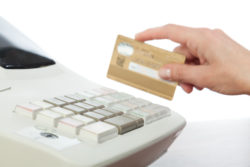Top Class Actions’s website and social media posts use affiliate links. If you make a purchase using such links, we may receive a commission, but it will not result in any additional charges to you. Please review our Affiliate Link Disclosure for more information.

While there are federal consumer protection laws in place, consumers are also advised to take their own precautions in debit and credit card receipt safety. Consumers should keep their receipts close to them, or opt to not get a receipt if it is not necessary.
In these cases, cash may be better to use in the transaction because no personal information is exchanged. Other steps consumers can take in debit and credit card safety include, but not limited to are:
- Carrying debit and credit cards separately in case wallet is stolen
- Notify bank or financial institution if traveling, along with the dates
- Draw line through any blank “tip” spaces on restaurant tickets or other receipts if applicable
- Regularly check balance and financial statements online
- Do not give account number over the phone to company representatives
- Any lost or stolen debit or credit cards should be reported immediately
- Set up fraud alerts with bank or credit union, to flag any suspicious transactions
- Contact bank or credit union if an email states there is something wrong with their account, instead of responding to it in case of phishing scam
- Secure smarthphones and other electronics used for online or in-store purchases
In addition, consumers should be careful with the receipts themselves to prevent anyone from seeing private account information. For this reason, credit cards may be safer than debit cards to use for most purchases. For debit cards, if the account number is listed on the receipt, it leaves the consumer’s primary checking account vulnerable to attack.
Even with consumers taking all these precautions, the chances of debit or credit card fraud and identity theft lowers significantly with the help of businesses. As mentioned before, there are consumer protection laws in place that require businesses to take certain steps to promote debit and credit card receipt safety.
Overview of FACTA Requirements
The Fair and Accurate Transactions Act (FACTA) was established by Congress to help combat the growing problems of identity theft and credit card fraud. Under FACTA, businesses must truncate the card number digits that appear on electronically printed debit and credit card receipts.
This is the process of limiting the card information that appears on a receipt to prevent vital personal financial information from being revealed. Under FACTA, all but the last five digits of the card number must be hidden or replaced with characters, and the expiration date must be completely omitted.
FACTA policy applies to all electronically printed receipts produced at cash registers, kiosks, and restaurant tickets. It is important to note that FACTA does not apply to imprinted or handwritten receipts.
Consumers should check their receipts to confirm if they are FACTA compliant, in order to maximize on their debit and credit card receipt safety. Businesses found to be in violation of FACTA could face civil liability in a FACTA lawsuit.
Free FACTA Class Action Lawsuit Investigation
If you made one or more purchases and the retailer provided you with a receipt that contained more than the last five digits of your credit or debit card number or the expiration date, you may be eligible for a free class action lawsuit investigation and to pursue compensation for these FACTA violations.
ATTORNEY ADVERTISING
Top Class Actions is a Proud Member of the American Bar Association
LEGAL INFORMATION IS NOT LEGAL ADVICE
Top Class Actions Legal Statement
©2008 – 2024 Top Class Actions® LLC
Various Trademarks held by their respective owners
This website is not intended for viewing or usage by European Union citizens.















One thought on Debit and Credit Card Receipt Safety Tips for Consumers
We check our banks every single morning. Then the emails. We earnestly watch any cashier when we use our debit or credit cards. We avoid restaurants that have the wait person take the debit or credit card in one of those little books, and then disappear with it to pay the bill. Or ONLY USE CASH at these type of restaurants. We keep our eye on the card, and make SURE we get an receipt. We are surprised how many places ask if we ‘want an receipt” ????? !!!!!!! After using a debit or credit card for the transaction. The store we have seen the most stunts at is Walmart on 82nd Avenue, Clackamas Oregon check stand number 4. Somehow the screen is set up so a customer doesn’ see that it automatically pops up as them wanting Cash Back like $20.00. Twice I almost got burned by not catching that it automatically said that I wanted $20.00 cash back. If I had turned away, and left the check out stand, and then later seen the “extra” $20.00 Cash Back I didn’t request or get–I’d have a hard time proving it to the cops. The Walmart employee had to be pocketing funds from customers this way.